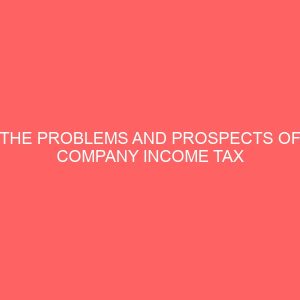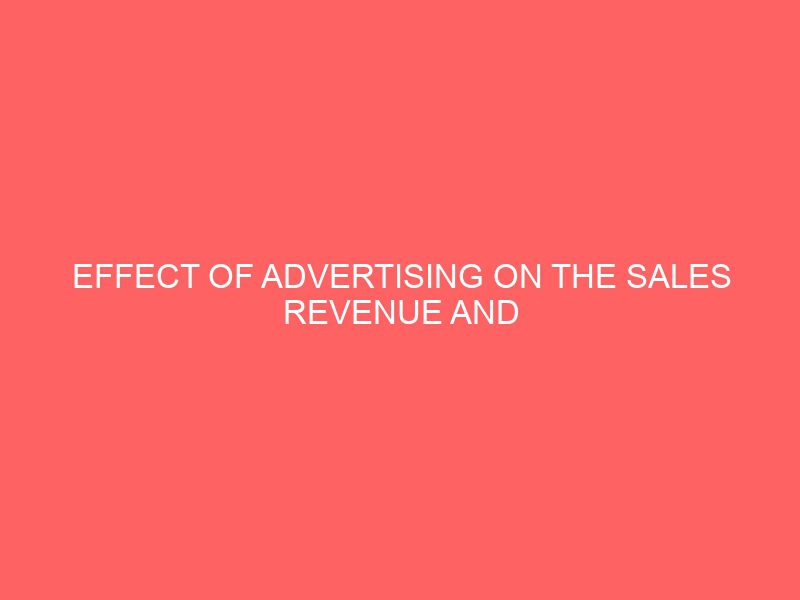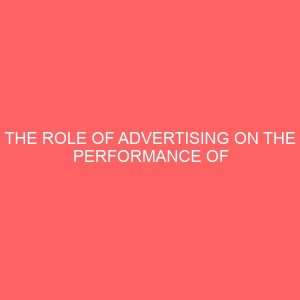Description
CHAPTER ONE
INTRODUCTION
1.1 Background to the study
The role of sales promotion in the form of advertising in promoting product and service awareness among consumers cannot be overstressed. Advertisement provides a platform for firms to create awareness about their products or services and how consumers can make the best out of such products. Olusegun (2006) opined that all advertisement must be honest and follow ethical standards and must not be perceived by the target consumer as lie; otherwise it can batter the image of a company and hinder it from building successful brands. Thus, for advertising to be effective, it must have an appeal, attract attention, command interest, inspire conviction and must provoke interest (Frank, 2005). In the same vein, Okeji (2008) posited that a good advert message should not be boring but rather reflect the lifecycle of the product. He concluded that advertising must be exposed in the right medium as this will enable organization to reach the right people with the right message.
A number of studies such as Herbert (1982), Nigel (1994), Gladson and Chinedu (2005) and Meshach (2007) have shown that advertising is a major competitive tool in establishing position in the market place. Companies use advertising not only to market and promote their products but to among other things wade-off competitors, improve their brands and create a vintage-point for their products in the presence of anticipated users, buyers or clientele. Persons, organizations, groups, government agencies and different sectors of many economies employ advertising to marshal messages to target public. This is because a well-crafted advertisement program can be a cost-effective way to disseminate messages and build brand preferences.
As is the trend globally, companies in Nigeria also rely on sales promotion to get their existing and prospective consumers informed about their products and services. Among all the tools of sales promotion in Nigeria, advertising has grown over the years to become the most prominent and easily understandable to firms and the general public (Haruna, 2005). It is therefore not surprising that resources committed to advertisement by firms in Nigeria have grown astronomically over the years. Studies by Akanbi and Adeyeye (2011) have posited that in Nigeria, advertising is more prominent among manufacturing firms, especially those in the food and beverages sector as awareness regarding their products can reach the consumers more rapidly through this channel. They also argued further that the companies listed under food and beverages sector stand distinct as a model for the use of advertisement to rapidly reach out to consumers. This can be substantiated by the revelations made by Kingsley (2012) who explained that Euro Monitor International in its recent findings showed that the Nigerian food and beverages sector was ranked one of the best-performing segments of Nigeria‟s manufacturing industry. The findings further revealed that operating capacity was generally at a higher level in the sector than within the Nigerian manufacturing sector as a whole, and the sector have shown good returns in the Stock Exchange.
Analysts such as Kingsley and Paul (2009) have argued that even though the use of advertisement as a promotional tool is common among manufacturing firms in Nigeria like food and beverages firms committing huge sums of money into advertising companies do not automatically translate to better performance indices for the organizations. It has been argued that advertising, even when very extensive, does not lead automatically to purchase because it is the culmination of a whole sequence of events (Abiodun, 2011).
The foregoing has shown clearly that advertising does not take place without the organization incurring some costs to that effect. Hence, many are of the belief that the desirability or otherwise of advertisement by firms in Nigeria could also be established when it is related in the context of sales and the profits that advertising companies realize at the end. Against this backdrop of controversy, it became very pertinent to investigate the extent to which the advertising costs of manufacturing firms in Nigeria affect their sales revenue and profits. Consequently, this study was conducted with the intent of establishing the extent to which the advertising costs of the food and beverages firms affect their sales revenue and net profits.
1.2 Statement of the Problem
It is an established fact that advertising plays a very significant role in creating product or service awareness in the market place. David and James (1982) argued that advertising is one easy way to educate existing and prospective consumers about a product or service. Although it is common for people to relate the performance of a company with the priority it gives to advertising, people tend to forget that advertising budgets are a huge source of costs for the organization. In fact, the amount of resources committed by firms to advertising has steadily grown over the years because of the increased awareness and sophistication of consumers (Kotler, 2009).
Companies in Nigeria, particularly those in the manufacturing sector consider advertising as an inevitable tool for survival in highly competitive market. Empirical evidence has proven that most products in Nigeria have close substitutes that are either locally produced or imported. This implies that companies would have to rely heavily on advertising to create a brand and distinguish it from other products in the minds of consumers. Thus, advertising in Nigeria has become the gateway to survival and the acquisition of market share. However, the need for survival, the desire to control larger market share and the dream of creating brand loyalty in the minds of consumers have made successful manufacturing companies in Nigeria, like the food and beverages firms, to pay much attention to advertising programmes without recourse to the extent to which advertising has been able to commensurately improve their performance.
Despite the fact that the advertising budget of the food and beverages sector had grown over the years to constitute a reasonable chunk of expenditure for the companies, little research attention has been paid to the effect of such advertising costs on the sales revenue and net profit of the firms in Nigeria. The study by Akanbi and Adeyeye (2011) which sought to establish the effect of advertising on the sales volume of Nigerian Bottling Company Plc utilizing composite data from the annual accounts and reports of the Company from 1999-2009. This particular study is unique and significant because it attempted to overcome the deficiencies of the previous studies by intending to rise up to the current realities by utilizing the data sought from Cadbury Nigeria Plc and Nestle Nigeria Plc both in food and beverages sector in Nigeria from 2000 to 2012.The previous studies used primary data which does not adequately capture relationships. Further, this study equally tried to establish stationarity test for the secondary data utilized for this study to avoid the results being spurious which the previous studies had failed to establish. This study therefore hopes to fill these gaps.
1.3 Research Questions
Following from the statement of the problem, the study seeks to find answers to the following basic questions:
- To what extent does advertising costs affect the sales revenue of selected food and beverages firms in Nigeria?
- To what extent does advertising costs affect the net profit of selected food and beverages firms in Nigeria?
1.4 Objectives of the Study
The main objective of the study is to determine the effect of advertising on the sales and profitability of the food and beverages‟ firms in Nigeria. The specific objectives of the study are to:
- Determine the extent to which advertising costs affect the sales revenue of selected food and beverages firms in Nigeria.
- Evaluate the effect of the advertising costs on the net profit of selected food and beverages firms in Nigeria.
1.5 Statement of Hypotheses
The hypotheses to be tested by the study; stated in the null form, are as follows:
H01: Advertising costs have no significant effect on the sales revenue of selected food and beverages firms in Nigeria.
H02: Advertising costs have no significant effect on the net profit of selected food and beverages firms in Nigeria.
1.6 Significance of the Study
The study expects to yield a number of desirable benefits, the most essential of which is contribution to existing knowledge. Specifically, the findings of the study would provide direction as to the effect of advertising costs or expenditures on the sales revenue and profit of manufacturing companies, especially those in the food and beverages sector. Thus, the study is expected to contribute to the not-so-well-developed body of knowledge regarding the association between advertising expenditures and the sales and profitability of manufacturing companies in Nigeria by empirically ascertaining the effect of such costs on the sales revenue and the net profit of selected food and beverages firms. Similarly, the study also hopes to expand the frontiers of knowledge in the area of conducting its analysis through the use of techniques that have been hitherto overlooked by previous researchers on the effect of advertising on the sales of companies in Nigeria.
Despite the fact that the advertising budget of the food and beverages companies had grown over the years to constitute a reasonable chunk of expenditure for the food and beverages sector in Nigeria, little research attention has been paid to the effect of such advertising costs on the sales revenue and net profit of the companies in Nigeria. The study by Akanbi and Adeyeye (2011) which sought to establish the effect of advertising on the sales volume of the Nigerian Bottling Company Plc utilizing composite data from the annual accounts and reports of the Company from 1999-2009. This particular study is unique and significant because it attempted to overcome the deficiencies of the previous studies by intending to rise up to the current realities by utilizing the data sought from selected food and beverages sector in Nigeria from 2000 to 2012. Further, this study equally tried to establish stationarity test for the data utilized for this study to avoid the results being spurious of which the previous studies failed to establish.
The importance of the findings of the study to the managers of manufacturing firms in Nigeria, especially those in the food and beverages sector could not be quantified in that it would provide evidence with respect to the justification of managers‟ increased resource commitment to advertising in Nigeria over the years. The findings would equip managers with better insights on how to juxtapose the benefits of increase in advertising expenditure vis-à-vis sales revenue and net profit. Furthermore, the study was also expected to be of immense utility to shareholders whose primary goal is to maximize their wealth. The findings of the study would help shareholders in their bid to monitor managers and ensure that only costs that could ensure the maximization of shareholders‟ wealth were incurred by managers on behalf of shareholders.
The outcome of the study might also be of benefit to government and its agencies in the process of making decisions. For instance, the findings of the study could guide the Advertising Council of Nigeria to understand the burden that advertising might constitute to the long-run growth and survival of firms in Nigeria, its benefit notwithstanding.
1.7 Scope of the Study
This study is concerned with the effect of advertising on the sales revenue and net profit of the selected food and beverages companies in Nigeria. The study restricted itself to the food and beverages firms in Nigeria because of the revelations by Kingsley (2012) which explained that Euro Monitor International in its findings showed that the Nigerian food and beverages sector was ranked one of the best-performing segments of Nigeria’s manufacturing industry. The findings further revealed that operating capacity was generally at a higher level in the sector than within the Nigerian manufacturing sector as a whole, and the sector had shown good returns in the Stock Exchange.
A period of thirteen years was adopted for the study ranging from 2000-2012, both years inclusive. The choice of the period has implications for the study because it is the period within which manufacturing companies in Nigeria especially food and beverages firms in Nigeria attached increasing importance to advertising programs. Thus, by implication, the period was chosen because manufacturing companies witnessed increasing importance of advertising budgets during the period.
1.8 Limitation of the Study
One of the major limitations for this study is the transportation cost incurred by the researcher. The data for this study which were extracted from the annual reports and accounts of the companies under study were got at the Abuja and Kaduna stock Exchange libraries respectively. This entailed huge sum of money to execute and had delayed the completion of this research beyond the time frame set by the researcher.
Further, many number of firms under the food and beverages sector would have been studied, but unavailability of necessary data had been a source of stumbling block. The researcher had no any other available option to him than to restrict the scope of this study to the companies under study.
Finally, the findings from this study could not be generalized across other firms since the data collected for this study were limited to food and beverages firms in Nigeria.
1.9 Definition of Terms
The following terms were in view of their technical meanings:
1.9.1 Advertising: It is any paid message presented through various media, such as television, radio, magazine, newspapers or billboards by an identified source.
1.9.2 Brand equity: It is the marketing effects and outcomes that accrue to a product with its brand name compared with those that would accrue if the same product did not have brand name.








Reviews
There are no reviews yet.